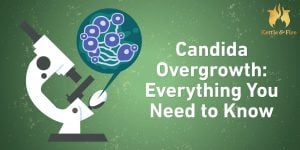What Does Collagen Do and Why Should I Try It?

You’ve decided that it’s time to take control of your health. One of the things you’ve noticed over and over in your online searches for nutritional products is collagen peptides. You see them sold by well-known celebrity doctors, by paleo advocates, and even by functional medicine practitioners and alternative healthcare professionals.
But what does collagen do exactly? Why should you consider using it? How does it help support your health, and how much should you be taking? Is there one form that’s better than another, or can you just head over to GNC and grab the first jar of collagen supplements you see?
Let’s explore what collagen does for your health. If you like the benefits we describe, you’ll learn how to confidently incorporate it into your diet.
What Is Collagen?
Collagen is the most abundant protein in the human body (and in most mammals and land animals as well). It’s a major component of your connective tissue (including the skin, your largest organ), and is also found in muscle tissue, bone, and the gut lining.
Collagen protein is made up of amino acids, primarily glysine, proline, and lysine. While the first two can be synthesized by your body (non-essential amino acids), lysine cannot. Since it’s an essential amino acid, you have to get it from the foods you eat. Foods rich in lysine are abundant: meat, eggs, fish, dairy, and legumes are all great sources, along with many fruits and vegetables (1).
Certain nutrients are required for collagen synthesis to take place, including vitamin C, which is why vitamin C is so vital to your skin health. Scurvy, for example, is the result of vitamin C deficiency: a breakdown of connective tissue, skin, and mucous membranes (2).
There are 28 different types of collagen, the most common being type I collagen, type II collagen, and type III collagen. Each one performs its own function in the body, whether it forms tendons (type I), cartilage (type II), or promotes healing and tissue repair, including preventing stretch marks and healing the digestive tract (type III). Read more about these three types here.
Why Supplement Collagen?
If your body makes collagen on its own, then why should you supplement it? The answer to that is multi-faceted. First, as you get older, your collagen production declines. As collagen formation decreases over time, you begin to show signs of aging like fine lines and and a loss of skin elasticity (3). Research suggests that supplementing collagen helps slow down the aging process by boosting collagen in the body and providing more material for your body to work with (4).
Second, unless you’re making a concerted effort to eat collagen-rich foods like bone broth or foods rich in the building blocks of collagen, there’s a chance you’re not getting quite enough through diet alone. There are certainly ways to ensure that you’re consuming collagen regularly in your diet, so if that’s your preference, you might not need to supplement at all.
Finally, collagen supplements are broken down into highly absorbable molecules that may make them easier to digest than gelatin- and collagen-rich foods for some. Studies have begun to show that these collagen powders (often called collagen hydrolysate or hydrolyzed collagen) are effective in improving skin elasticity, gut health, and joint health (4, 5, 6).
What Does Collagen Do?
Besides the various anti-aging benefits of collagen offers, it also plays a major role in gut health, bone health, and joint health. Let’s talk about gut health first.
Heals and Seals the Gut Lining
The gut lining remains sealed when we produce adequate collagen, preventing leaky gut syndrome and other problematic conditions of the digestive system. Leaky gut syndrome occurs when microscopic holes in the digestive tract begin to form, allowing partially digested food particles and bacteria that should remain inside the intestines to leak out into the bloodstream. It can happen for a number of reasons, including:
- An overactive immune system, which can lead to chronic inflammation and autoimmune issues
- Poor diet that allows bad bacteria in the gut to propagate and create inflammation in the gut
- Some sort of gut dysbiosis like SIBO or other bacterial overgrowth
There are likely also some genetic factors and early life factors that can predispose an individual toward leaky gut, but more research on those risk factors needs to be done.
Collagen supports the healing and sealing of leaky gut. Glutamine, another amino acid required to produce collagen not only support this process but reduce inflammation by blocking cytokine production (7).
Supports Bone and Joint Health
Now that you know that collagen sources the material that makes up joints, tendons, cartilage, bones, and other connective tissue, you could probably easily conclude that adding more collagen to your diet would support the health of those body parts.
You would be correct in that conclusion. A study of 147 athletes over a 24-week period tested the hypothesis that consuming collagen would alleviate activity-related joint pain. They found significant evidence to support that hypothesis (6).
Other studies also show that type II collagen helps alleviate joint pain from both rheumatoid arthritis and osteoarthritis, due to its ability not only to quell inflammation in the joint itself, but also to calm an overactive immune system (the root source of rheumatoid arthritis) (7).
Sourcing Your Collagen
By now you’re probably convinced that adding new collagen sources to your diet will be beneficial for you in one way or another. Whether you’re looking for anti-aging solutions, help healing a skin condition, relief from bone or joint pain, or a tool to heal your leaky gut, adding collagen to your diet is the easiest first step to take.
How you source your collagen is entirely dependent on which way you think will lend itself to consistency. Behavior change is all about being consistent, so if you believe that the best way to remember to consume collagen every day is with collagen coffee, then go grab yourself a can of high-quality collagen hydrolysate. If you believe that a warm mug of bone broth will do the trick, go for it. If smoothies are your jam, add the powdered stuff to your shopping list.
There are also a number of other foods that can help you add collagen to your diet, some of which can be dumped right into that smoothie, others that are healthy parts of a balanced diet. The best way to approach collagen consumption is to know yourself and what you’ll stick to, so find what you like and hit the ground running.
Pin for later:










